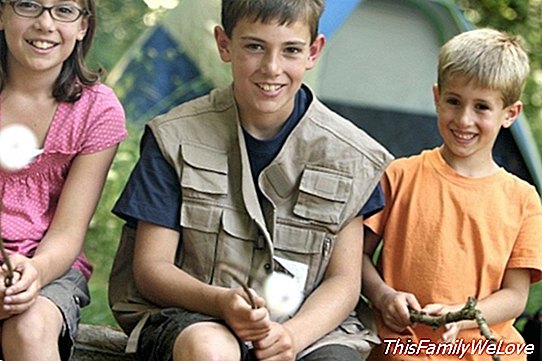Summer camps without protocols in child allergy

One in four children in Spain has some type of allergy, according to data from the Spanish Society of Clinical Immunology, Allergy and Pediatric Asthma SEICAP. This figure increases every year so that more and more children can be found in schools and summer camps with allergic disease, especially asthma, food allergy and pollen allergy. Are the summer camps prepared to deal with cases of child allergy that may arise?
The SEICAP warns that most of the summer camps they do not have any protocol of action against child allergies. Pediatricians allergists warn that most do not know how to deal with cases of allergic reactions, not having adrenaline autoinjectores or trained personnel.
Every year the number of children with allergies increases 2%, so SEICAP advises to be prepared for its integration and adaptation in all environments and to follow some recommendations that it has included in its website www.seicap.es. "It is necessary to raise awareness among all of society and the Administration on the importance of promoting a safe environment for these children.In the case of summer camps it is even essential because they spend a lot of time outside their homes and without the usual surveillance of his parents, as in school, "warns Dr. Juan Carlos Juliá, coordinator of the Health Education Work Group of the SEICAP.
Although most children at this age are already aware of the care they have to follow or how to identify the symptoms, "a series of measures must be taken to avoid dangerous situations that may lead to a child suffering from anaphylaxis and In case of accident, act quickly to save your life, "adds Dr. Juliá.
How to identify the symptoms in case of allergy?
The Health Education Working Group recommends the following list of measures to be carried out in the summer camps and that these be prepared for the arrival of children with allergies:
1. A person responsible for the care of children with allergies or asthma should be assigned and know how to act in case of reaction.
2. This person responsible must have a copy of the diagnosis and treatment report prepared by the pediatric specialist.
3. Both the person in charge and others responsible for the care of these children should receive training from a health professional. Dining staff should be informed of any food allergies.
4. The person in charge must guard the medication, inhalers or adrenaline autoinjectable, in a safe place but accessible in case of emergency. Also, you will have to know how to administer it in case it is necessary and urgent.
5. The staff must know how to identify and evaluate what type of symptoms the child is manifesting in order to administer the correct treatment:
The most common symptoms are:
to. Itching or mild rash on the mouth and lips
b. Urticaria, hives or itching of limbs or other area of the body
c. Redness and tearing of the eyes
d. Repeated sneezing, runny nose, and runny nose
The most serious symptoms:
to. Hoarseness, closed throat, repetitive cough and swelling in tongue, eyelids, lips or ears.
b. Breathy breathing, exhaustion, skin or bluish lips.
c. Weak pulse, low blood pressure, fading and pallor.
6. In case of allergic reaction, the personnel in charge of the minor must:
to. NEVER leave the child alone
b. Call the emergency department and report the allergic reaction
c. Even if the minor's parent or legal guardian can not be contacted, do not hesitate to administer the corresponding medication
d. ALWAYS take the child to a medical center
7. It is recommended the adrenaline administration before the most common symptoms, to avoid its progression to a serious reaction and, in case of this one, it should be used of obligatory form.
8. The camp should have immunity from prosecution for the consequences of administering emergency or rescue medication.
What to do in a case of anaphylaxis?
Keep in mind that most cases of anaphylaxis occur outside the home. So it is also necessary that the personnel that forms part of these centers be trained in the care and management. "They should know the symptoms that these children can have in case of allergic reaction and know how to administer the rescue treatment, the autoinjectors of adrenaline, because in many cases it can be vital," says Dr. Juliá.
The training programs of these monitors include first aid, but nothing of allergic diseases and their attention in case of emergency."Although children with risk of anaphylaxis can be allowed to carry autoinjectors in their backpacks, it is recommended that the first-aid kits in the camps have at least two," he says.
Finally, allergist pediatricians consider it important that the protocol includes communication measures between the parents, the health center and the camp. "In case of emergency It is essential the contribution that parents and health professionals can give to indicate what to do in each situation. In addition, it contributes to give security to the parents ", argues Dr. Juliá, a recent study conducted in the USA and published in BMC Pediatrics confirms that one in four parents of children with allergies have concerns about their safety at school. In addition, most consider that the implementation of policies in these centers are necessary.
Camps for allergic children
Many parents of children with allergic diseases feel insecure when taking their children to conventional camps in the absence of information or the lack of protocols for action. Therefore, various members of SEICAP, through the Health Education Working Group, organize summer camps and colonies for children with asthma or food allergies, the most frequent.
Marina Berrio
Advice: Carlos Mateos / Rocío Jiménez. COM HEALTH.




